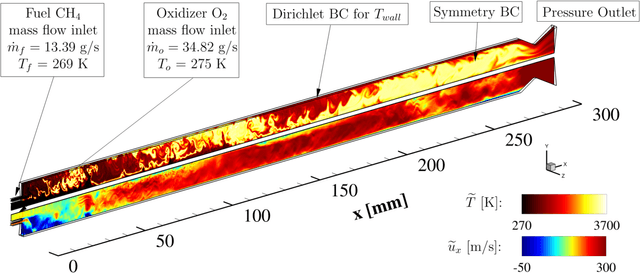Data-assisted combustion simulations with dynamic submodel assignment using random forests
Paper and Code
Sep 12, 2020



In this investigation, we outline a data-assisted approach that employs random forest classifiers for local and dynamic combustion submodel assignment in turbulent-combustion simulations. This method is applied in simulations of a single-element GOX/GCH4 rocket combustor; a priori as well as a posteriori assessments are conducted to (i) evaluate the accuracy and adjustability of the classifier for targeting different quantities-of-interest (QoIs), and (ii) assess improvements, resulting from the data-assisted combustion model assignment, in predicting target QoIs during simulation runtime. Results from the a priori study show that random forests, trained with local flow properties as input variables and combustion model errors as training labels, assign three different combustion models - finite-rate chemistry (FRC), flamelet progress variable (FPV) model, and inert mixing (IM) - with reasonable classification performance even when targeting multiple QoIs. Applications in a posteriori studies demonstrate improved predictions from data-assisted simulations, in temperature and CO mass fraction, when compared with monolithic FPV calculations. These results demonstrate that this data-driven framework holds promise for the dynamic combustion submodel assignment in reacting flow simulations.
 Add to Chrome
Add to Chrome Add to Firefox
Add to Firefox Add to Edge
Add to Edge